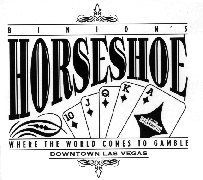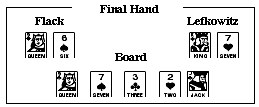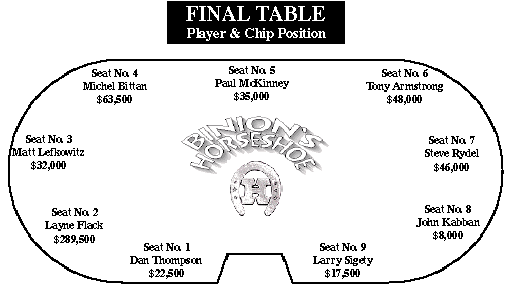

|
Volume 30 • Number 12 • May 8, 1999 |
| previous event |
| next event |
1999 Champion
LAYNE FLACK
Event #12 Results
Texas Hold'em (Pot-Limit)
$3,000 Buy-in
| 1. Layne Flack | $224,400 |
| Missoula SD | |
| 2. Matt Lefkowitz | 112,200 |
| Brookline MA | |
| 3. Steve Rydel | 56,100 |
| Stoke-on-Trent, UK | |
| 4. Tony Armstrong | 33,660 |
| Dallas TX | |
| 5. Paul McKinney | 25,245 |
| Princeton WVA | |
| 6. Larry Sigety | 19,635 |
| Las Vegas NV | |
| 7. Dan Thompson | 14,025 |
| Olympia WA | |
| 8. Michel Bittan | 11,220 |
| Engelwood NJ | |
| 9. John Kabbaj | 8,985 |
| London, UK | |
| 10. Eli Elezra | 6,730 |
| 11. Lucy Rokach | 6,730 |
| 12. Mickey Appleman | 6,730 |
| 13. John Bonetti | 6,170 |
| 14. Paul Phillips | 6,170 |
| 15. Gloria Tschetschot | 6,170 |
| 16. Allan Stonum | 5,610 |
| 17. Phillip Broderick | 5,610 |
| 18. Alex Gurevich | 5,610 |
Total Prize Pool: $561,000
Number of Entrants: 187
Entries to Date: 2,625
Prize Money to Date: $6,350,500

LAYNE FLACK IS UNSTOPPABLE
IN WIRE-TO-WIRE VICTORY
Flack amassed many of his chips when he won a $140,000 pot from 11th place finisher Lucy Rokach (aces against kings), and then could coast. "I felt I played tremendous," he said. "I never got out of line. They expected me to, but I didn't." Flack, who has already run numerous other tournaments, was the best all-around player at the Commerce Casino's L.A. Poker Classic this past February.
Matt Lefkowitz, a poker player from Brookline, Massachusetts, finished second...which was just what he aimed for. "The situation was obvious," he said. "I did the opposite of what everyone else did by letting other players fire at Lane get busted. I couldn't believe they did it. Lane played great, the way he got players to bluff against him." Lefkowitz, also 30, has made six final tables since December and this is his fourth time in the money at the WSOP. Propped up against his chips was a photo of his mixed black Labrador, Nola. "I take her with me to the final table to keep my perspective," he explained. Whenever I have a bad beat, I just look down at the picture."
London poker player John Kabbaj was first out. He managed to double the $8,000 he started with but then put it all in with a pair of tens against fellow Brit Steve Rydel, a retired jeweler. Rydel held A-Q and hit a queen on the river. Michel Bittan, an Englewood, New Jersey realtor, finished eighth. He held A-6 of diamonds against Flack's pocket tens. The flop was 6-4-2. Flack bet $18,000 and Bittan raised with all his chips, but coudn't help his sixes.
Dan Thompson, an Olympia, Washington, furniture store owner, then went up against Rydel. He had much the best of it with A-Q of hearts against Rydel's A-J offsuit and moved in for his last $12,500. But a jack hit the turn to end his hopes. Larry Sigety, a Vegas resident and one-time dealer, departs next. He challenges Flack by going all in with pocket fives. Flack quickly calls with Q-10. The board comes K-10-3/2-8, and Sigety settles for sixth place.
Now Tony Armstrong, a Dallas businessman playing his first major tournament, picks up an A-Q and shoves in all his $42,500. Flack calls with jacks. In one of his rare beats, he loses when a queen flops and Armstrong gets a reprieve. Later, Flack tries a creative play. Holding a 5-2, he makes a small raise and is called by Paul McKinney, a 74-year-old retiree with nine WSOP final table finishes to his credit. On the turn Flack makes a straight and checks, but McKinney, who has been playing the game for 66 years, is too wily to take the bait. When Flack bets out on the river, he folds.
An hour has gone by and Flack, with $335,000, has 60 percent of the chips. McKinney is next to be eliminated when he suffers a bad beat against Flack. With the board showing 8-6-4-9, McKinney, holding tens, bets $22,000. Flack calls with 7-6, giving him a pair of sixes and an open-end straight draw. Another six comes on the river; McKinney bets and loses his last $35,000. By 6 p.m. nobody has been able to inflict any meaningful damage on Flack, who now holds $400,000 in chips. In later action, Lefkowitz puts in a small raise. Armstrong sees he has K-J and re-raises his last $20,000, declaring, "It's now or never." It's never. "I'm dead," Armstrong moans when Lefkowitz shows him kings. A jack flops, but it's too little too late, and Armstrong cashes in for $33,660.
Steve Rydel, the winner of this event last year, is not destined to repeat. He fires his last bullet by betting $21,000 with A-J. He knows he's in big trouble when Flack calls and turns over an A-Q. No one improves on a board of K-K-4/K-3, and now it's heads-up.
Lefkowitz has gotten his wish to survive this far. He knows only a miracle or terrible play on Flack's part can win it, and he's not counting on Flack. Still, he doesn't give up. He goes all in and doubles up when his A-J prevails over Flack's A-6 of diamonds, but still has a mountain to climb. Then Flack gets cute again and tries to trap Lefkowitz when he checks an eight-high straight on the end, but Matt doesn't bite.
It finally ends when the board shows Q-7-3. Flack, with Q-6, moves all in and Lefkowitz, with K-7, calls for $27,000. A deuce and a jack then fall, and Flack is the pot-limit champ.

Welcome Back, Mr. Flack
by Andy Glazer
©1999 Andrew N. S. Glazer, all rights reserved. Used with permission. Andrew N. S. Glazer is the author of Casino Gambling the Smart Way available at most bookstores.What does a 500-pound gorilla do with eight other finalists in a World Series Pot Limit Hold 'em tournament? Anything he wants.
When Layne Flack, a rather trim young man to be cast in the role of a 500 pound gorilla, showed up today, he broke a World Series record for arriving at a final table with the largest percentage of the chips. That record was set last year, by a 499-pound gorilla named... Layne Flack.
In last year's Pot Limit finale, Layne arrived at the final table owning 49% of the chips. But things can turn around in a hurry in pot limit, and Layne wound up coming in second.
This year, Layne broke his own record, arriving at the final table with $289,500 of the $561,000 in action, 51.6% of the chips. At least he didn't make the Mark McGwire mistake of breaking the record by so much that he'll never be able to break it again.
Layne learned an important lesson last year, though, and given another chance to play out the gorilla scenario, held onto his chips and was never seriously threatened at any point. "I played a little tighter than I normally do," Flack said afterwards. "I didn't want to double anybody up."
"Tighter" didn't mean he was mucking anything less than the nuts, though. We found out what kind of day it was going to be right away when Michel Bittan raised a 6-4-2 flop, and Layne came over the top of him for the rest of Bittan's $22,000. Bittan thought for about a minute and called with A-6. Layne turned over pocket tens. When the turn and river changed nothing, Bittan, the man whose A-6 had put the cruel beat on John Bonetti (see yesterday's story for the details) and enabled him to reach the final, had exited the tournament on the very same hand.
If the Bittan knockout was ironic, Layne's takedown of 73-year old Paul McKinney (who has been playing for 66 years and thus had a slight experience edge on the 30-year old Flack) was stylish. With the board showing 4-6-8-9, McKinney picked up a $22,000 stack and placed it in the pot. He then reached back for some additional chips and started piling them on top of the original bet. Layne shook his head sideways, a clear "no you can't do that," and Tournament Coordinator Bob Thompson quickly ruled that McKinney couldn't go back into his stack for more. Faced with only a $22,000 call, Layne decided to go with his 6-7, third pair and open-ended straight draw; he probably wouldn't have called a larger bet with it.
McKinney, meanwhile, realized that Layne's unwillingness to call a larger bet meant weakness, and when a six hit on the river, instantly bet the remainder of his chips. Layne had missed his straight draw but tripped up, and McKinney's pocket tens went down to the number of the beast.
Matt Lefkowitz, another rising star--he's playing in his 6th major tournament final table since December--is sitting immediately to Layne's left, and shakes his head and smiles good-naturedly while saying, "you're blessed." Just to disprove the divine intervention theory, Layne got Steve Rydel, the event's defending champion, all-in before the flop a couple of hands later, Layne holding A-K to Rydel's 10-9, but Rydel flopped a nine and added a ten on the turn for emphasis. "Shake it off," yelled Jack Fox from the rail. The gallery was boisterous and partisan all afternoon.
Layne didn't look shaken. Even after this hand, he held about $400,000 in chips, with Lefkowitz holding $41,000, Tony Armstrong (playing in the first tournament of his life) at $70,000, and Rydel holding the $50,000 he'd just stolen.
Did I say "stolen?" I meant "borrowed." A few hands later, Layne limped in from the big blind with 2-6, flopped 5-6-J, and got most of the $50,000 back when a six hit on the river, the second time in half an hour that he'd made trips 6s on the river.
At this point Lefkowitz added a corollary to his "blessed Layne" theory. Figuring that the blessing was some sort of communicable condition, he rubbed Layne's left triceps several times, trying to get the luck to rub off and cracking up the gallery. Matt now had 50k, Tony 60k, and Steve 30k, and Mr. Flack had 420k. An intriguing endgame awaited the three trailers.
"I knew before the day started it was all about trying to maneuver for second, and then if I could get there, to take my shot then," Matt later explained. "My strategy was to play the opposite of the other seven trailers. If they were playing fast, I was going to be conservative, and vice-versa. It turned out that they came out playing fast at Layne, which I just couldn't believe, and not at each other, so I was able to sit back and not risk my chips while they went after Layne."
Bright lad. Rydel was the next to try his luck against the leader, going all-in with A-Q against Layne's A-K. The flop was harmless enough, 6-6-4, but when a queen hit on the turn, Matt--not Layne, but Matt--jumped up, exclaimed "Oh god!" and landed his jump with a deep-knee bend and an agonized expression. And why not? With the first place payoff of $224,400 so far out of reach, Matt's "let Layne take 'em down" strategy had a chance to be worth second place money of $112,400; even third was worth $56,100. Rydel has slipped away a second time, and as a result, Matt was only guaranteed the $33,660 fourth place money. A full minute later, Matt was still exhaling heavily, just as if it had been he and not Flack who had taken the beat.
During the next regularly scheduled break, the always-modest Flack turned to me and said "I'm not afraid to tell you, I can't play any better than this." This wasn't quite as obnoxious as it seems; we'd become friendly at the Bay 101 Shooting Star tournament. When dealing with strangers, Layne is sometimes more modest. On the form all finalists fill out, giving their hometowns, ages, poker accomplishments, etc., Layne listed "I once took third in a 20 person freeroll tournament!" as his only accomplishment. Of course, this was more reverse psychology than humility, but he's done a lot in a short time on the big tournament circuit. He won the second big tournament he ever entered, the '97 Hall of Fame No-Limit Hold 'em event, and arrived at this World Series fresh off two victories (and Best Overall Award) at the LA Poker Open VIII.
When play resumed, two of the trailers finally decided to battle each other instead of the gorilla. With the blinds at $2,000 and $4,000, Matt bet $12,000, and Tony says "it's now or never," going over the top with his last $20,000. Matt called instantly, his reason obvious when he flips pocket kings up onto the table. Tony says, "I can't win," and turns over K-J. After flopping a Jack, Tony indeed CAN win, but doesn't, and Matt has almost doubled up. Recording a 4th place World Series finish in his first-ever tournament, Tony can go home both richer and proud.
Meanwhile, Layne continues his session-long practice of attacking the blinds, picking up small pots and usually laying his hand down if the blind comes back hard at him. He attacks Rydel, who comes back over the top, but this time Layne doesn't back down and turns over A-Q suited. Rydel shows A-J offsuit.
"LET'S PLAY HOLD 'EM, JUST ONE TIME," shouts someone from the rail, apparently alleging that hold 'em is a game where the best pre-flop hand is supposed to win the pot. Rydel has already pulled two Houdini-like escapes against Layne but this time the best hand holds up, and Matt Lefkowitz has perfectly executed his well- conceived plan. He's outlasted the other seven pretenders, and now he can try to double through a few times against the gorilla. He's going to need help from the cards, trailing $465,000-$96,000.
The cards don't cooperate, though. Layne keeps chopping away, and Matt must lay down hand after hand. He doubles up once, but only after losing many small pots, and eventually gets his last few chips all-in holding K-7. Layne holds Q-6, and the board of Q-3-7-2-5 hands the title to the fastest gun to come out of Missoula, Montana in quite some time.
The crowd applauded both players heartily, and both deserved the praise. Lefkowitz, the pride of Brookline, Massachusetts (he grew up there, honed his game for eight years in the cardrooms of northern California, but moved back last year to be closer to his family), put on a short stack-play clinic. Flack did an equally good job of showing how to hold a lead, and it was doubly impressive after his failure to hold the lead last year. He learned his lesson, and how many of us can say that?
"Layne played so well today, it was scary," Lefkowitz said. "I don't think I've ever played as well as he played today. He got people to bluff at him, he knew when second pair was good, and he played aggressively without putting lots of chips at risk. A perfect job of maintaining a lead."
"Matt was great," Layne said, "No mistakes. But I felt like I played tremendous. I never got out of line, and that was important because everyone expected me to steamroll."
The meeting of the Finalist Mutual Admiration Society concluded, I asked Flack if the win would boost his confidence for the Big One, now only couple of days away. "I gotta make sure I don't get OVER-confident," he admitted. "That is one tough tournament. Playing the game isn't hard, but maintaining your composure for four straight days is."
He talks fast and brash, he's younger, thinner and richer than I am, he has a nice girlfriend, and he's a heck of a lot better at poker than I am. It sure seems like there's a long list of reasons why I shouldn't like this guy, but I can't help it. Maybe I just have a weakness for guys named Flack; I dedicated my book Casino Gambling the Smart Way to my deceased friend and mentor, Milt Flack, apparently no relation. But that's probably not it. My age, waistline and wallet are my issues, not his, and as to the brash part, it ain't bragging if you can back it up.
He'll be more impossible than ever after picking up a bracelet, of course. I wouldn't advise giving him too much flack about it, though. He's got enough Flack as it is.
